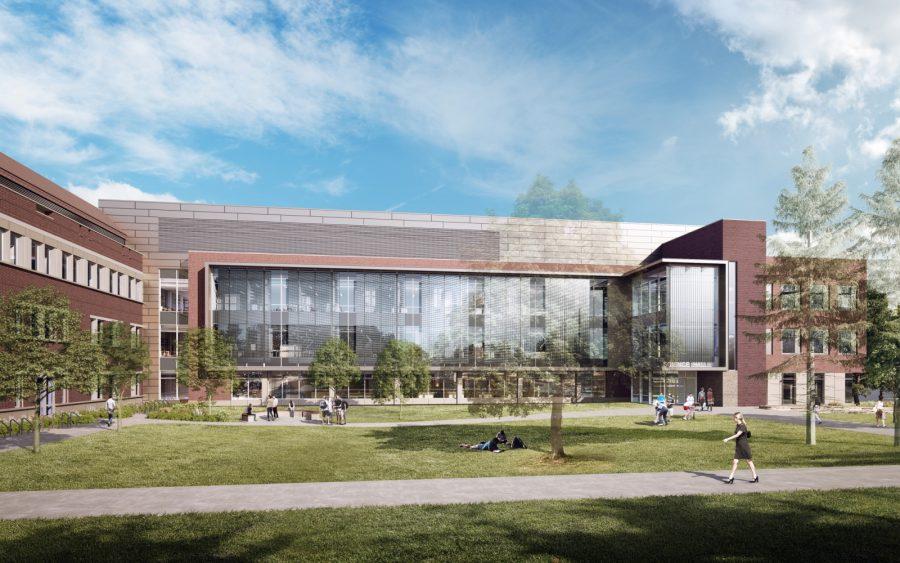Several administrators and faculty have begun to outline and search for a new Science, Technology, Engineering and Mathematics (STEM) Programming Manager for the 2019–2020 school year.
According to Carleton’s Network of STEM Education Centers (NSEC) page, the position will, among other responsibilities, involve promoting and organizing STEM-related events, acting as an interdepartmental liaison and managing and coordinating space usage in the new Integrated Science Facility, the College’s new project that will connect and renovate Hulings and Olin Hall via demolishing Mudd Hall and constructing additions to the complex. The Facility is slated to open this fall with the goal of housing new, state-of-the-art classrooms and environments for STEM-related classes.
“To succeed in STEM fields, students need to think creatively and in an engaging way, and we hope that having a space where it’s part of student and faculty daily routines to interact with people from other disciplines—STEM and non-STEM—will make this a habit that students will carry beyond Carleton into their careers and into their daily lives,” said Dr. Jennifer Wolff, Chair of the Biology Department and its representative on the Science Facilities planning committee.
Wolff, along with representatives from other departments and programs across the school, has helped discuss the planning of the Integrated Science Facility and facilitate conversations that led to the creation of the STEM Programming Manager position.
“In these conversations, which took place over the last two years, we discussed our vision for leveraging the new space to facilitate collaborative, integrated programming among STEM programs and departments, and across the Carleton community, with non-STEM department and programs as well as offices like the Career Center, the Center for Community and Civic Engagement (CCCE) and Summer Programs,” said Wolff.
“We agreed that we are excited about expanding existing and future interdisciplinary work, and that having a staff person to support these programs and to help facilitate partnerships, as well as shared space use and functions of the new facility, would be the best way to help us carry out this vision.”
“Given that we have such lofty goals for the Integrated Science Facility, it seemed an appropriate time to evaluate whether we have the right set of personnel to support the things that we and our students want to do with the new space, not just within scientific disciplines but across campus,” said Matt Whited, Associate Professor of Chemistry and one of the key agents in outlining the new position.
“For instance, interfacing with the arts and humanities in meaningful ways and reaching out to the public in Northfield and beyond,” he added.
In creating the position, Whited noted that the planning group looked within the Carleton community and at peer institutions for guidance.
According to Gretchen Hofmeister, a Chemistry professor and the “project shepherd” for the Science Planning Group that helped plan the new Facility, the position was intended to help future scientific growth and initiative among students.
“The vision that we developed for this project focused on preparing Carleton students to be leaders in STEM far into the future,” she said. “The kinds of scientific challenges that we face—such as developing sustainable energy sources, mapping the human brain and developing more individualized medical tools—require interdisciplinary approaches to address. In addition, new technologies have immense power to both improve life for humanity and cause harm.”
Hofmeister added that this mounting importance surrounding the management of innovation warrants more proactive and interconnected future STEM leaders to ensure a beneficial relationship between the sciences and liberal arts. To this end, the creation of the STEM Programming Manager position was intended to increase diversity and the fruition of new problem-solving approaches within such fields.
According to Hofmeister, a Carleton 2017 Winter Break all-STEM faculty retreat produced, several new “common” goals across departments aimed at promoting new organizational structures for STEM at the school. Some goals included using “a coordinated approach to inclusion and broadening access” and helping “students prepare for careers more broadly and reflect on their own learning in an integrative way.” The new position was a part of those goals, Hofmeister said.
Hofmeister added: “This will help student education in STEM to be more interdisciplinary, coordinated and integrated into student research, work in the community, work in other departments and co-curricular activities.”










